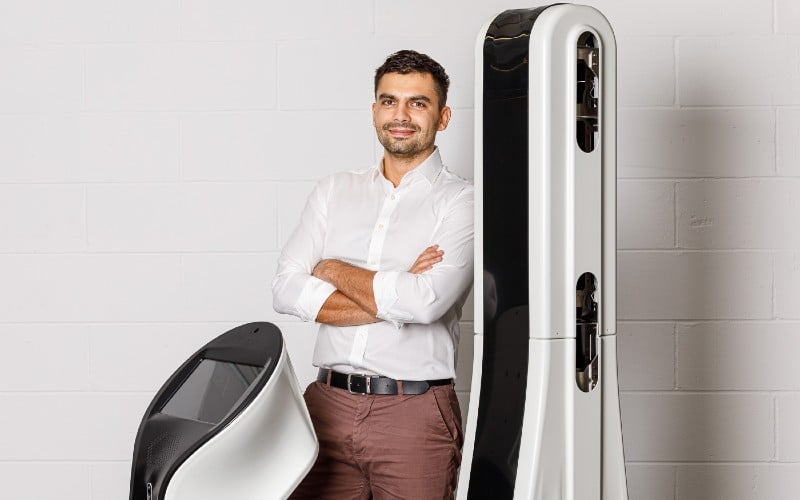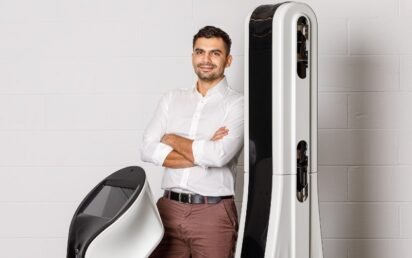Turning a great idea into a great business is the secret sauce sought by entrepreneurs the world over.
One founder who seems to have a taste for it is Andrei Danescu, CEO of intelligence and robotics company Dexory.
The London firm – rebranded from BotsAndUs last year – is a provider of real-time data insights using autonomous robots that measure, track and find goods across warehouses without manual intervention.
Danescu built his first robot in Romania aged 8 and came to the UK 13 years ago to study before taking further engineering courses at Coventry and Cranfield University.
Pursuing an early dream of working in Formula 1, he applied for over 120 roles in the motorsport while at Cranfield, eventually landing one with Force India as a trackside engineer. Travelling the world with the team for a year taught him the importance of teamwork, delivery and measurable performance – but he had already displayed the grit to succeed.
“My biggest advice to startup entrepreneurs would be to make sure you have the grit and determination to follow through on your dreams,” he tells TechBlast. “If you really believe in what you’re building, and you make it your life’s work, you will find a way.
“It’s never easy and it gets harder every step of the way, but persevere and push through. You will become stronger and more resilient – so keep pushing.”
Need for speed
Next came Jaguar, working in research and development covering areas including tyre modelling and sensor fusion. He then began building robots in the house he shared with two friends back in Romania, Adrian Negoita and Oana Andreea Jinga – now co-founders – and BotsAndUs was born.
“The number one quality that gives startups an edge is speed – speed of execution and problem-solving. But in order for speed to materialise, it requires a huge effort on the part of everyone involved,” he continues.
“You have to be relentless in your execution, development and outreach, which can mean 1000s and 1000s of messages and repeat messages. You really need to find a way to cut through background noise to reach people – whether it’s talent, investors, customers or strategic partners.”
The company raised £11 million in seed funding in June 2022, led by Lakestar and featuring Maersk Growth, Kindred Capital and Capnamic. This took its total funding to $20m.
However the groundwork for the round was completed far earlier. “We started working on the first complete iteration of our autonomous robot over six years ago and found it challenging to find external funding for it,” he reveals. “There were several reasons – we were a young team, based in Europe, and what we wanted to build was hugely complex.
“Typically, European investors have far less appetite for very high risk and high complexity businesses. But it was encouraging for us to see that we seldom came away with an outright ‘no’. A lot of the investors we spoke to early on were keen to see if we could secure a couple of customers before they offered us their full backing and support.
“We pivoted to other sources of funding that were available such as through Innovate UK and other EU grants and public funding bodies. This allowed us to bootstrap the product to a level where not only could we show it to other investors but also to future customers. With a prototype to demo, we were able to get more letters of intent as well as initial trial customers.
“The next requirement was for us to expand our team. This time, after a lot of work we received just over two million Euros through a European Union fund. It was a turning point in our journey. This enabled us to put some serious investment into the technology and bring it to a level where we could actually commercialise a complete product.
“Having got to this stage, we went back to our preferred investors, Kindred Capital, who remained true to their word and put in the pre-seed investment. They also helped us secure an amazing co-investor from Germany – Capnamic Ventures, in one of our key markets. By the time March 2020 came around, we had large EU grant funding, an additional grant from the US and the pre-seed funding round closed.”
Mission critical
Danescu says taking on funding brings huge responsibility and takes up time – but says founders shouldn’t lose sight of their mission as a result.
“It’s the nucleus of what brought the team around in the first place, and will keep it together throughout the tough times,” he explains.
“Finding the right partners with the same mindset is also crucial. From the initial team you put together right to the customers you engage with, it is very important to have the right relationship there. And, never be satisfied with the first option. Always try to find better value, have multiple options to choose from and drive the best deal for your company.
“It’s a mental game for the most part, so find a way to build that resilience inside you and thrive in the unknown. It’s just as hard for everyone even if some will try to make it sound like a walk in the park.”
Working with the likes of Menzies Aviation, Maersk, Huboo and several other logistics and warehousing organisations in the UK and across Europe, it has gone from a team of 5 to a team of 35 in a couple of years, with plans to grow another 50% in the coming months.
“We are now very lucky that we have all these big, high-profile companies like Maersk opening doors to us and being very interested in our technology,” says Danescu.
“Identify what the market really wants and once you have done that, act fast. In our case we needed to capitalise on the opportunity we got and make sure we sign up as many customers as we could.
“There’s a lot of competition so you cannot afford to stand still when you’re breaking new ground. You have to be agile and nimble, and be creative.”
Global expansion
On plans for the future, he says: “We want to keep growing continuously – as hard as we can, as far as we can, as fast as we can. We have the ambition to be deployed at scale, not only in and across Europe but also the US in the next 18 months.
“We want to also start exploring Asia as there is a huge opportunity in the area. We don’t want to just be deploying with new customers, we want to scale up within our existing customers so that we are deployed across dozens or even hundreds of their sites.”


